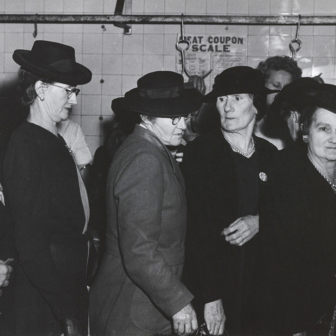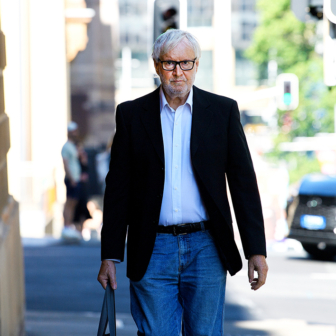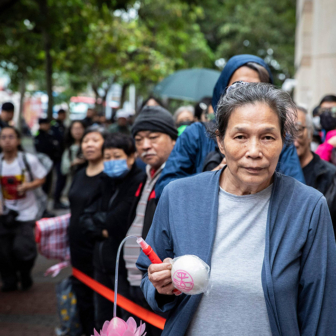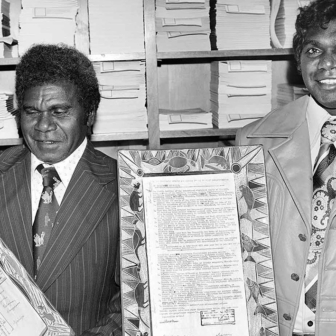Not for the Faint-Hearted: A Personal Reflection on Life, Politics and Purpose
By Kevin Rudd | Pan Macmillan Australia | $44.99 | 674 pages
The two Rudd prime ministerships were probably not the most barren in Australian political history. As Kevin Rudd reminds us in the epilogue to this seemingly interminable book — at around the point he gently breaks the news that we are to have a sequel — his was not a government without achievements.
Most significantly, Australia managed to weather the global financial crisis. Just how much of the credit should go to Rudd — and how much to Wayne Swan, to Treasury, to China and to Peter Costello’s budget surpluses — is for economic historians of the future to argue over. But we can be confident Rudd will claim a large measure of the credit when volume two is published.
There’s nothing wrong with that. Politicians will be politicians. Memoirs are about legacies, and politicians writing memoirs will err on the side of generosity — to themselves.
But Kevin Rudd has a rather large problem in writing about his political career. He needs to explain why, in the end, it was such a disappointment. For there was surely not a single observer of his victory on 24 November 2007, Rudd included, who could have imagined that his prime ministership would be over in less than three years.
Rudd therefore spends much of this massive tome quietly preparing us for what will come in the next. We can be sure that the perfidy of factional bosses will loom large, and no less certain that Julia Gillard will play a starring role, well supported by Wayne Swan. But Rudd hasn’t too many hard words to say about his loyal deputy on this occasion. The betrayal, when it comes, will be unexpected. Indeed, he reminds us of his generosity on election night 2007 in introducing Julia to “a wider Queensland audience” that “didn’t really know her.” There will be plenty of opportunity for repentance.
If the Rudd government had enjoyed anything like the electoral success of its two predecessors — the Labor governments of Bob Hawke and Paul Keating (1983–96), and the Coalition government of John Howard (1996–2007) — we would recently have marked its first decade in office. Perhaps Rudd would still be there, as Howard was still there after ten years — holding off an increasingly frustrated deputy in Gillard, as Howard did with an ever more exasperated Costello. Or perhaps Rudd might have achieved a feat only managed by one other Australian prime minister, Robert Menzies, and passed the reins to Gillard voluntarily. But it is hard to find anything in his career to suggest that he would have been capable of making that most difficult of calls for a political leader: “I am not indispensable and it is time to go.”
Over the course of 600 pages, Not for the Faint-Hearted takes us up to election night 2007. If Menzies had adopted a kind of “weight-for-age” approach to political memoir based on Rudd’s allocations, he would have produced some 3600 pages — presumably delivered, like Manning Clark’s A History of Australia, in six glowing volumes. Rudd might object that, in contrast with his own action-packed prime ministership, nothing much happened during Menzies’s time in office. But then there wasn’t a great deal going on in the Australian embassy in Stockholm when Rudd was third secretary there in the early 1980s.
As is so often the case, the media coverage of these memoirs told us little more than which of his former colleagues the author had taken the opportunity to knife. But this book is more than one-in-the-eye for Wayne Swan, although Rudd doesn’t entirely spare his former colleague. Indeed, Swan performs a critical part in Rudd’s self-presentation: he is the anti-Rudd, the factional mediocrity necessary to bring out, in full living colour, the very best qualities in our hero.
Rudd, for instance, claims that after he had made a “high-minded” reply to Swan’s query about why he wanted to enter politics, Swan “summed up his worldview in a single shattering sentence: ‘Bullshit, it’s just a game, mate — but it’s the best game of all!’” A memoirist less preoccupied with payback might have hesitated before claiming that this was Swan’s “worldview.” Someone more disinterested than Rudd might have wondered whether this was not an Australian male dealing, in a down-to-earth Australian way, with a political neophyte rather too inclined to the high-minded rationalisation of personal ambition.
Elsewhere we encounter Rudd reporting Joel Fitzgibbon’s claim that Mark Latham appointed Swan as Treasury spokesman after the 2004 election defeat “as one giant joke” on the party, designed to bequeath Latham’s successor “a permanent Achilles heel”: “At the time, I thought Joel’s thesis was just too Machiavellian to be believable. Years later, however, it would give me pause to wonder.” As it turned out, Rudd claims, Swan “just wasn’t up to the job.”
Despite wearing his need for revenge on his sleeve, Rudd always has the purest of motives. When he pays the obligatory visit to Rupert Murdoch before the 2007 election, just as Tony Blair had done a decade before him, it is of course “a thoroughly unremarkable dinner.” It was certainly less remarkable than Rudd’s evening in a New York strip club with one of Murdoch’s executives. Rudd, having participated in an unsuccessful effort to save a Vietnamese-Australian drug trafficker from the noose in Singapore, claims to oppose capital punishment “as a matter of personal conscience”; yet his approach to such matters was rather more flexible when it came to the fate of the Bali bombers shortly before the 2007 election.
At around the same time, he engineered the expulsion of union leaders from the Labor Party, in one case apparently for using bad language and getting caught on camera doing so. Yet even by his own account, Rudd was no choirboy. None of this makes him less admirable, or more hypocritical, than any number of other Australian political leaders one might name. But it sits uncomfortably with the smell of sanctimony that suffuses this book when Rudd contrasts his own political motives and actions with those of his enemies.
“Politics is, in the end, a decision to act,” the dust jacket of this book proclaims, and Rudd makes it clear from the outset that his only motive for getting into politics was to make a difference. Progressive politics is about representing the many rather than the few. It’s all about others. It’s about making the world a better place. But to paint such an image of yourself in suitably vivid colour requires a villain, a political “other.” You might imagine that John Howard could fill this role rather well, but in modern Australian politics the bitterest hatred is reserved for your rivals in the party. It is those dubbed “The Roosters” by Mark Latham — Wayne Swan, Stephen Smith and Stephen Conroy — who represent for Rudd all that is wrong with modern politics, and especially with the Labor Party. They are the “machine men… Theirs was not a world of ideas; it was a world of naked political power, at its best as a means to an end, at its worst as an end in itself.”
The cold, heartless and faceless factional (or union) thug is, of course, a familiar trope in media representations of the Labor Party. And Rudd is nothing if not a skilled media performer. He knows which buttons to push to make himself look his best, while rendering the behaviour and motives of others sordid and amoral. Yet even now, for all Rudd’s huffing and puffing about Labor’s factions, and after all he has endured, there is little indication that he understands what he got wrong in his dealings with the party. “The ultimate source of my political authority would in time become the Australian people themselves,” he grandly declares. “My authority never came from the formal power structures of the party itself, least of all the factions.”
This isn’t even formally correct, let alone true in any more abstract sense. Rudd got his shot at the prime ministership because he was elected to parliament as a member of the Australian Labor Party, and then because he was later elected by caucus to lead the Federal Parliamentary Labor Party. Like anyone who wants to go anywhere in the party, he joined a faction and later, as he sought the leadership, he lined up the wider factional support he needed to get rid of Kim Beazley. The factional bosses and a majority of caucus supported him because they doubted Beazley could win and they hoped Rudd could.
Rudd prefers the more satisfying image of “the political mafia of the national right,” which couldn’t stand the thought of his supposed independence from their control, waiting for the “normal wear and tear” of government to take its course so it could then strike. This is no doubt a comforting image for Rudd. It might also be convincing to readers who accept that the contribution of Labor factional chieftains to the sum of human happiness has been, at best, a modest one. The operation of Labor’s factional system is not pretty and, at its worst — and it has often been at its worst since the 1990s — it has helped to make the federal party ungovernable and unelectable.
But none of this makes Rudd’s account of himself any more persuasive, for it rests on a false notion of Australian politics, both in theory and practice. Rudd is wrong in theory because his account confuses a Westminster parliamentary democracy with a presidential system. Even in these days of disillusionment with the major parties, voters mainly cast their ballots for candidates representing the parties competing for government. They do not provide an unmediated source of authority for a prime minister, no matter how many people are wearing Kevin07 t-shirts or how many stellar appearances one puts in on Sunrise. But Rudd is also wrong in practice because he ignores the essential place that party management — including factional management — needs to play in any sustained exercise of prime ministerial power.
This is one of the reasons why Rudd has no idea of what to do in this book with John Howard, who was prime minister for the entire period Rudd was a member of the opposition. While recognising Howard as “the most formidable conservative politician of his generation” and claiming to have observed closely “his strategy, his tactics and his demeanour,” Rudd appears not to have noticed that Howard was remarkably successful in managing his own party — right down to those dinners with backbenchers in the parliamentary dining room. Rudd sees his predecessor’s cunning, ruthlessness and ideological ambition but not the fact that Howard governed for almost twelve years at least partly because he managed people superbly. Rudd did not.
Rudd takes us on a lengthy excursion through his years as a diplomat, afterwards working for the Goss government in Queensland, then his time as a federal Labor backbencher, opposition foreign affairs spokesman and opposition leader. His years in state government taught him about politics and gained him some necessary political contacts, but he seems to regard the eventual demise of the Goss government as none of his business. Rudd’s role in that government has attracted criticism, but you wouldn’t imagine so in reading his account.
After a painful, failed attempt to enter federal parliament at the Howard landslide of 1996, he ran a successful consultancy assisting Australian businesses in China, before winning the Brisbane suburban seat of Griffith in 1998. We then encounter a succession of failed Labor leaders: Kim Beazley, Simon Crean, Mark Latham and Beazley again, before the party turns to Rudd. Unsurprisingly, he is especially scathing about Latham, “at his core… a controversialist, who first and foremost yearns to be at the centre of the public debate as an end in itself.” There are lengthy accounts of the various scandals and failures of the later Howard years, an unhappy period in the history of this country for which we are likely to be paying in one way or another for at least a generation.
Rudd raised his profile massively via the industrial-scale corruption of the Australian Wheat Board scandal, which he pursued relentlessly against the government in general, and Alexander Downer in particular — “the longest-serving, though least significant, foreign minister in Australian history.” Like Howard’s, Rudd’s career profited from the elevation of national security matters in the aftermath of 9/11 but as so often, there was fighting talk in opposition, and an absence of action in government. Rudd complains about the narrow terms of reference of the Cole Royal Commission into the wheat-for-weapons affair, but didn’t himself launch a more wide-ranging enquiry when he came to office. Nor did he establish anything resembling the British Chilcot Inquiry into what he calls “Howard’s Folly,” Australia’s participation in the Iraq war. His excuse for not doing so — that it would be a distraction from his agenda — is embarrassingly thin, although he at least accepts some blame for the failure.
Not for the Faint-Hearted is written sometimes in a rather breezy style, and sometimes rather preachily. There are humorous anecdotes — such as his account of assisting a businessman trying to promote to the Chinese the Maxi-Crapper, a dual-flush dunny. And there are also a few “dad jokes” that fall rather flat. Much of the comedy is of the self-deprecating kind in trivial matters that famous men who’ve reached the top of the tree can afford when writing their memoirs.
The book is possibly at its best — or at least at its most revealing — in its account of Rudd’s upbringing and education. Not only is much of this material unfamiliar, it’s occasionally moving. He recounts, for instance, how his mother bought new carpet and furniture before he first took his future wife, Thérèse Rein, to visit her. His account of these early years provides a powerful confirmation of David Marr’s reading of Rudd in his explosive Quarterly Essay, published in 2010 not long before his fall. Rudd has been deeply wounded by the poverty of his upbringing as well as the cruelties he suffered on its account, and the indignities of being dependent on others’ charity. He remains angry about it all, too. His drive, ambition and idealism are intimately related to this experience.
The early death of his father — after a car accident and hospital infection — was formative, as were the valiant struggles of his mother to make ends meet. The pattern of a distant or absent father and a mother who is doting or idolised are familiar enough in the biographies of political leaders — interestingly, it’s also there in Latham’s background. Rudd’s spiritual yearnings, meanwhile, are a reminder that the study of political leadership ignores religious belief at its peril. By his own account, Rudd’s Christianity was not only critical in his political formation, it has remained central to his sense of public purpose, his “vocation” to act in the world.
It’s hard not to admire the determination with which he learned a difficult language, Mandarin: the same drive and discipline that saw him through that program at the Australian National University have also been present in his public life. Burgmann College at the ANU was also where he met Rein. For Rudd, his wife and family have clearly been an anchor and a refuge. He credits Rein with getting him more in touch with an underdeveloped emotional side of his character, “however incomplete my own transformation might have been.”
Will Rudd return to this matter as he contemplates his prime ministership in volume two? He made his first emotional misstep as prime minister on the night of his election when, in inviting his audience to go home and have a cup of tea and an Iced VoVo, he badly misread the mood of the moment. If Rudd understands how flat that speech left so many people whose hearts had been broken by what Howard had done to the country, people who were looking for a new and inspiring message about where their new prime minister would take them, there is no sign of it here.
It was a bad start to Kevin Rudd’s prime ministership yet also, sadly, a hint of many of the things to come. ●




